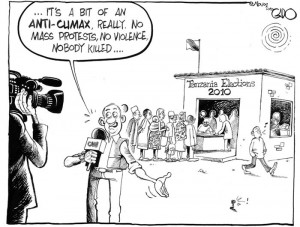THE EMERGENCE OF A REAL OPPOSITION
In Tanzania’s elections on 31 October 2010, for the first time since independence, an opposition party made significant gains in votes and seats in Tanzania’s National Assembly. The ruling CCM party’s presidential candidate Jakaya Kikwete saw his vote drop to 61% compared with 80% in 2005. Leading opposition CHADEMA presidential candidate Dr Wilbroad Slaa got 26% and the presidential candidate for the Civic United Front (CUF) (whose main strength is in Zanzibar) Professor Ibrahim Lipumba was in the third position with 8% of the vote.
The ruling CCM party lost 55 seats in parliament while the CHADEMA party increased its seats from 5 to 24. Thus, Tanzania now has a viable opposition party in parliament and observers are anticipating lively debates.
TANZANIA SHOWERED WITH PRAISE
Tanzania was showered with praise on its conduct of the elections from the large contingent of foreign observers in the country and by heads of state and leaders of international organisations.
The elections passed largely peacefully although there were many minor incidents in individual constituencies before the elections when CCM was involved in often passionate debates on the selection of its parliamentary candidates and during the counting of the votes when there were complaints about the delay in publishing some results.
BUT THE OPPOSTITION PROTESTS
CHADEMA, while accepting the validity of the parliamentary elections, and after an apparently heated internal debate on what to do, refused to recognise the re-elected President Kikwete because it believed that the published results of the presidential election had not been correct. The Party’s MP’s then walked out when the President began his inaugural speech to the new parliament.
CHADEMA leader Freeman Mbowe said that their aim was to pressurise the government into changing the constitution so that future elections would be free and fair. He said that his party was not satisfied with the way the presidential votes had been counted and the results announced.
He pointed out that the law and did not allow anyone to question the presidential election results yet it was possible to question the outcome of parliamentary and civic polls. The law had been drawn up during the period of the one-party state and was now obsolete. CHADEMA would press for the formation of an independent commission to examine the presidential poll results and to make proposals on the preparation of a new constitution.
Asked if CHADEMA’s readiness to meet the government was not against their stand not to recognise President Kikwete, Mbowe explained that they acknowledged the presence of the head of state though they were not in agreement with the way he was elected.
CCM REACTIONS
CCM Publicity Secretary John Chiligati said that what CHADEMA MPs had done was an ‘act of treason against democracy.’ He said the elections were endorsed by local and foreign observers who said it was free and fair. What CHADEMA was doing was ‘incitement to violence.’
The Citizen quoted Prime Minister Pindo as saying that CHADEMA MP’s had shown weaknesses in handling issues and its MPs had proved to be still very young democratically. Mr Pinda said he had been ready to meet with CHADEMA and discuss their problems but they had decided to take another measure which was not helpful in building the country’s democracy and bringing development.
President Kikwete told parliament that there was no way for any person to avoid CCM’s government. “People will come and go but this is the CCM government and it will remain in power whether they like it or not. I am the President and they will end up bringing their problems to me,” he said.
In the following weeks the demands for a new constitution grew amongst wide sections of the population.


Pingback: John Magufuli defeated two women former UN deputy secretary general Asha-Rose Migiro and Ambassador to the US Amina Ali in the final vote to secure the nomination. - Quartz
Pingback: Tanzania’s ruling party nominates John Magufuli as presidential candidate | Ecowas Tribune
Pingback: Tanzania's ex prime minister Edward Lowassa is running for president with Chadema the party that once called him corrupt - Quartz
Pingback: Tanzania’s ex-PM is running for president with the party that once called him corrupt | Eagle Online
Pingback: John Magufuli's Tanzania can throw you in jail for saying negative things about him on social media — Quartz